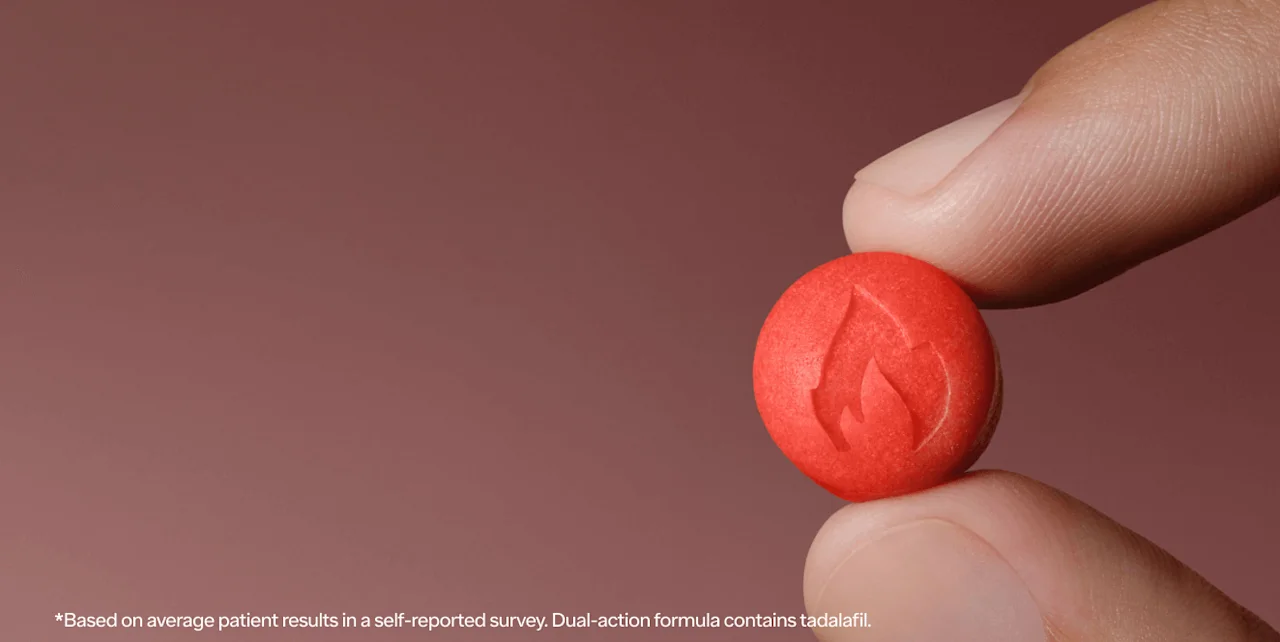Here's what we'll cover
Here's what we'll cover
Here's what we'll cover
Pornography can be part of normal, healthy adult sexuality. But excessive consumption can desensitize you or alter your sexual appetite, potentially leading to porn-induced erectile dysfunction. The good news is that you can reverse ED if it is triggered solely by porn — it just takes some habit changes.
Below, we unpack what the science says about porn and ED, including how to fix porn-induced ED, how long recovery might take, and next steps for tackling ED that's not purely porn-related.
5 ways to reverse porn-induced erectile dysfunction
ED can often be reversed by addressing the underlying causes. So, if you think you’re experiencing porn-induced ED or porn addiction-related ED, your first step toward recovery is reflecting on the cause: your porn use.
Here’s how to reverse porn-induced ED:
1. Take a break from porn
If you think porn is the root cause of your ED, start by removing the problem. Porn-induced ED is thought to be a form of psychological ED. So re-learning how to masturbate or have sex without porn can be a reminder that you can achieve sexual satisfaction even in the absence of porn.
Research is clear that while porn doesn't directly cause ED (more on that below), frequent pornography use can lower your satisfaction with actual sex. And a negative mindset about sex — such as a belief that you need to perform or that your erection should be harder— can lead to performance issues.
So why not stop this cycle in its tracks? Take a break from porn. Try sexually stimulating yourself or a partner without porn to remind yourself that you can achieve sexual satisfaction without the added sights and sounds.
2. Consider therapy
Consult someone (ideally, a healthcare professional) who can help identify the psychological factors that may be at play.
Hey, we get it: Talking about your sexual health struggles can be easier said than done. But there's scientific proof that psychotherapy can help with ED, porn-induced or not.
The thing is, porn makes it very easy to compare yourself to images of others. And research shows that negative genital self-image can lead to sexual performance anxiety that triggers ED, particularly in younger populations.
A mental health professional, such as a therapist, can help you understand your relationship with porn. They can also offer strategies for tackling performance anxiety and negative self-image — both of which may be contributing to your porn-induced ED.
3. Communicate with your partner
Tell your partner what's happening.
Erectile dysfunction can be difficult for both you and your partner, so it is essential to have honest and safe conversations where you can both communicate openly.
Research shows that sex-positive communication between partners is key to reversing ED. Open communication is also just plain good for your relationship and sex life.
4. Try out some cognitive behavioral strategies
Journal through your porn cravings — and give yourself a pep talk if needed.
Data from an online pornography abstinence forum reveals several cognitive behavioral therapy (CBT) tactics that can help you get through a porn fast. These tactics include:
Journaling. Some men said putting pen to paper when experiencing a porn craving helped them reframe their thinking and push through their desire.
Practicing self-talk. Other individuals found that motivating self-talk helped them get through their porn fasts by also reframing their thinking.
Turning to a go-to substitute. For example, some people said that taking a cold shower instead of watching porn helped regroup and reroute.
These strategies may not have a direct impact on the firmness of your erections. But they can help you make it through a scheduled break from porn as you try to reverse porn-induced ED.
5. Rule out other ED causes
Schedule an appointment with your healthcare provider. A whole mix of psychological and physical factors can cause erectile dysfunction.
So, if you're having sexual performance issues, tell your healthcare provider. Even if porn is part of the problem, you could also be dealing with high blood pressure, low T, or a combination of factors that are contributing to your ED.
Bottom line: Since ED can be a sign of underlying medical problems, it's important to consult your healthcare provider about any new or ongoing sexual performance issues.
5 ways porn can cause erectile dysfunction
Now that we’ve covered how to reverse it, it helps to understand the potential causes behind porn-related ED or porn addiction ED.
First, can porn cause erectile dysfunction? There’s little evidence that porn alone consistently causes ED. But the effects of heavy porn use can worsen erectile function indirectly.
Here’s how.
1. Changes in brain activity
Frequent porn consumption may change the way your brain experiences pleasure and reward. As the brain is fed frequent, intense sexual stimulation, it requires more frequent and extreme stimuli to achieve the same response: sexual arousal and satisfaction.
Researchers generally say that in the brain, porn addiction behaves a lot like drug addiction. The more you use, the more you crave bigger “hits” of sexual stimulation.
The potential fallout? Real-world sexual stimulation may no longer be enough for your brain — and penis — to feel aroused.
2. Unrealistic expectations
Over time, watching hardcore sexual performances by hyper-sexualized actors can alter a person’s sexual appetite.
The result? You might feel like you need more to get an erection. More exciting visuals. More aggressive sexual behaviors. More stimulation.
And when real-life sex doesn’t meet unrealistic expectations, a person might start feeling less aroused by their partner — a key factor in getting or keeping an erection.
3. Performance anxiety
Excessive porn viewing could slowly morph your expectations of how the average male body looks or behaves.
Naturally, comparing yourself to a porn star (or anyone, for that matter) can trigger some deep self-consciousness and performance anxiety. And there’s nothing like sexual stage fright to mess with your ability to stay aroused and in the moment.
4. Reduced libido
Some experts believe excessive exposure to pornography can result in a decreased libido (sex drive), especially when it’s coupled with frequent masturbation.
Over time, the brain can begin to associate arousal and release exclusively with the quick, controlled gratification of solo activity rather than real intimacy.
This can dull the natural anticipation and excitement that typically builds through partnered sexual connection.
As a result, sexual desire toward a partner may wane, making real-life encounters feel less stimulating or even burdensome compared to the instant relief pornography provides.
5. Penile desensitization
Masturbation doesn’t cause ED, but frequent and aggressive masturbation can reduce penis sensitivity.
So, if you masturbate often to hard porn or you start using more forceful stimulation on yourself while watching porn, you could have a harder time getting or keeping an erection during ordinary sexual encounters with a partner.
What exactly is porn-induced erectile dysfunction?
Porn-induced erectile dysfunction isn’t an official medical diagnosis. It refers to a situation in which excessive porn consumption has led to a form of psychological ED — trouble getting or maintaining an erection.
If you’re at the point of Googling “porn-induced ED,” chances are you’re already familiar with the phenomenon. Here’s a quick rundown of what you need to know:
Porn-induced ED is not a medical diagnosis. Can porn cause erectile dysfunction? Yes, but it’s complicated. Little to no research suggests that porn directly causes ED. But heavy porn use can cause other issues that can lead to a form of psychological ED.
Porn-induced ED may be more common in younger men. Most people experiencing ED have a contributing physical condition. But psychological factors are responsible for a significant amount of ED diagnoses in men younger than 40. In fact, some studies suggest up to 85% of men under 40 have psychogenic causes contributing to their ED.
Porn-induced ED may be temporary. Temporary erectile dysfunction refers to ED that lasts less than six months. In most cases, psychological ED, such as porn-induced ED, can be reversed in less time (if you commit to the necessary changes).
Porn-induced ED recovery timeline
There is no definitive timeline for recovering from porn-induced ED. That’s likely because ED often involves an interplay of both physical and psychological factors.
That said, there have been two studies on recovery timing for men with psychological ED. And porn-induced ED is more often than not a form of psychological ED. So, we can look to this research for an idea of how long it may take you to recover from porn-induced ED.
In a very small study of people with an average age of 38, 71% of participants successfully reversed psychological ED within three months. Some said that simply being diagnosed with psychological ED helped them solve the problem. Others credited sex therapy or a medical evaluation that confirmed healthy erectile function.
In a larger study of a more diverse population, 32% of men with psychological ED reported full recovery within 1–2 weeks of diagnosis. Researchers hypothesized that simply assuring men that their erectile function was normal resolved these cases. Partners’ attitudes — supportive vs. angry — strongly influenced patients’ ability to reverse ED.
Weeks 1 and 2 | Weeks 2–10 | Weeks 10–12 (< 3 months) |
|---|---|---|
32% experience improvements | Continued improvement, especially with positive partner feedback | 71% experience remission |
Note: This is a sample porn-induced ED recovery timeline based on data from studies on men with ED caused solely by psychological factors. Individual experiences may vary.
What to do next: other causes and treatments for ED
Not all ED is porn-related. Having trouble getting and/or staying hard? Consult a healthcare provider who can help you rule out or identify other causes, like impaired blood circulation orbeing on medications that contribute to ED.
Depending on the cause of your ED and whether your erection issues are temporary or chronic, you might benefit from one or more of the following ED treatment options:
Prescription ED medications. Medical treatment for erectile dysfunction often involves taking a PDE-5 inhibitor such as Viagra (sildenafil) or Cialis (tadalafil). Certain PDE5 inhibitors also come in other, non-pill formulations. Examples include Ro Sparks, a sublingual treatment containing sildenafil and tadalafil, and Daily Rise Gummies, a chewable gummy with tadalafil. (While these last two options are not FDA-approved, their active ingredients have been individually FDA-approved for the treatment of ED.)
Making healthy lifestyle changes.Obesity, a sedentary lifestyle, and smoking can all increase the risk of ED. But you can support erectile function by losing weight (if needed), eating a heart-healthy diet, and doing aerobic workouts several times a week.
Non-drug ED treatments. Devices like penis pumps and cock rings can help physically cause firmer erections, too. In some cases, when other options are not working, healthcare providers may recommend a surgical penile implant. Be sure to discuss the risks and benefits of these options with your healthcare provider if you have further questions.
It’s important to know that medications for ED target physical causes. Some people may find they also address psychological causes indirectly by increasing their confidence levels. But this may not work well for everyone, especially those who crave more stimulation due to excess masturbation or pornography consumption.
It’s important to avoid developing a dependence on physical and psychological preferences that can’t be fulfilled during partnered sex if your goal is to have a satisfying sexual connection with your partner(s).
Bottom line
Does porn cause erectile dysfunction? In some cases, yes, indirectly. Here’s what you need to know about porn and erectile dysfunction:
Porn doesn’t directly cause erectile dysfunction. Heavy porn consumption — or high consumption of hardcore porn — can cause lower sexual satisfaction, performance anxiety, and (in the case of excess masturbation) even penile sensitivity that contributes to psychological ED.
Porn-induced ED is often reversible. Erection problems triggered by the effects of heavy porn use can often be resolved by taking a break from porn and addressing psychological factors like performance anxiety and unrealistic expectations.
It’s still important to tell your healthcare provider. Not all ED is porn-related. If you’re having trouble getting or maintaining an erection, consult with a healthcare professional. It might be time to test for underlying physical causes like hypertension, diabetes, and more.
Frequently asked questions (FAQs)
Is porn-induced ED real?
Porn-induced ED is not an official medical diagnosis, but that doesn’t mean it’s not a real phenomenon or experience. ED can absolutely occur due to psychological causes like sexual performance anxiety or a higher threshold for sexual stimulation triggered by excessive porn use or porn addiction.
How long does it take to recover from porn-induced ED?
Some men have recovered from psychological ED (like porn-induced ED) in a matter of days. Others may find that recovery takes a few months.
Can medications help porn-induced ED?
Maybe. Medications, such as Viagra and Cialis, can help many people with ED. But these prescription treatments are intended to treat physical causes of ED. They might not cure ED that’s caused by performance anxiety or high expectations from pornography use. In some cases, though, ED meds can indirectly help since they can boost confidence by helping with erections. But remember, to truly treat the underlying causes of psychological ED, therapy is more likely to help.
Does age matter with porn-induced ED?
Research suggests that men under 40 are most likely to develop psychologically caused ED, like porn-induced ED. But there’s no evidence that older men can’t also experience porn-induced ED.
DISCLAIMER
If you have any medical questions or concerns, please talk to your healthcare provider. The articles on Health Guide are underpinned by peer-reviewed research and information drawn from medical societies and governmental agencies. However, they are not a substitute for professional medical advice, diagnosis, or treatment.
Viagra Important Safety Information: Read more about serious warnings and safety info.
Cialis Important Safety Information: Read more about serious warnings and safety info.
References
Azarnik, M., Rafeipour, A., Hatami, M., et al. (2024). Communication and sexual skills in marital functioning and satisfaction and reduced marital conflicts among Iranian couples: A systematic review. Journal of Education and Health Promotion, 13, 202. doi: 10.4103/jehp.jehp_1182_22. Retrieved from https://pmc.ncbi.nlm.nih.gov/articles/PMC11392282/
Berger, J. H., Kehoe, J. E., Doan, A. P., et al. (2019). Survey of Sexual Function and Pornography. Military Medicine, 184(11-12), 731–737. doi: 10.1093/milmed/usz079. Retrieved from https://pubmed.ncbi.nlm.nih.gov/31132108/
Carvalheira A, Træen B, Stulhofer A. Masturbation and Pornography Use Among Coupled Heterosexual Men With Decreased Sexual Desire: How Many Roles of Masturbation?. Journal of Sex and Marital Therapy, 41(6), 626-635. doi: 10.1080/0092623X.2014.958790. Retrieved from https://pubmed.ncbi.nlm.nih.gov/25189834/
Ciaccio, V. & Di Giacomo, D. (2022). Psychological Factors Related to Impotence as a Sexual Dysfunction in Young Men: A Literature Scan for Noteworthy Research Frameworks. Clinics and Practice, 12(4), 501–512. doi: 10.3390/clinpract12040054. Retrieved from https://pmc.ncbi.nlm.nih.gov/articles/PMC9326597/
Dwulit, A. D. & Rzymski, P. (2019). The Potential Associations of Pornography Use with Sexual Dysfunctions: An Integrative Literature Review of Observational Studies. Journal of Clinical Medicine, 8(7), 914. doi: 10.3390/jcm8070914. Retrieved from https://pmc.ncbi.nlm.nih.gov/articles/PMC6679165/
Fernandez, D. P., Kuss, D. J., & Griffiths, M. D. (2021). The Pornography "Rebooting" Experience: A Qualitative Analysis of Abstinence Journals on an Online Pornography Abstinence Forum. Archives of Sexual Behavior, 50(2), 711–728. doi: 10.1007/s10508-020-01858-w. Retrieved from https://link.springer.com/article/10.1007/s10508-020-01858-w#Sec9
Jacobs, T., Geysemans, B., Van Hal, G., et al. (2021). Associations Between Online Pornography Consumption and Sexual Dysfunction in Young Men: Multivariate Analysis Based on an International Web-Based Survey. JMIR Public Health and Surveillance, 7(10), e32542. doi: 10.2196/32542. Retrieved from https://pmc.ncbi.nlm.nih.gov/articles/PMC8569536/
Janssen, E. & Bancroft, J. (2007). The Dual-Control Model: The role of sexual inhibition & excitation in sexual arousal and behavior. In: Janssen E, ed. The Psychophysiology of Sex. Bloomington, IN: Indiana University Press, 2007, 197-222. Retrieved from https://psycnet.apa.org/record/2007-12163-011
Jenkins, L. C. & Mulhall, J. P. (2015). Delayed orgasm and anorgasmia. Fertility and Sterility, 104(5), 1082–1088. doi: 10.1016/j.fertnstert.2015.09.029. Retrieved from https://www.ncbi.nlm.nih.gov/pmc/articles/PMC4816679/
Kalaitzidou, I., Venetikou, M. S., Konstadinidis, K., et al. (2014). Stress management and erectile dysfunction: a pilot comparative study. Andrologia, 46(6), 698–702.doi: 10.1111/and.12129. Retrieved from https://pubmed.ncbi.nlm.nih.gov/23822751/
Krzastek, S. C., Bopp, J., Smith, R. P., et al. (2019). Recent advances in the understanding and management of erectile dysfunction. F1000Research, 8, F1000 Faculty Rev-102. doi: 10.12688/f1000research.16576.1. Retrieved from https://pmc.ncbi.nlm.nih.gov/articles/PMC6348436/
Kühn, S. & Gallinat, J. (2014). Brain structure and functional connectivity associated with pornography consumption: the brain on porn. JAMA Psychiatry, 71(7), 827–834. doi: 10.1001/jamapsychiatry.2014.93. Retrieved from https://pubmed.ncbi.nlm.nih.gov/24871202/
Landmark, B. F., Almås, E., Brurberg, K. G., et al. (2012). The Effects of Sexual Therapy Interventions for Sexual Problems. Knowledge Centre for the Health Services at The Norwegian Institute of Public Health (NIPH). Retrieved from https://pubmed.ncbi.nlm.nih.gov/29319959/
Park, B. Y., Wilson, G., Berger, J., Christman, M., Reina, B., Bishop, F., et al. (2016). Is internet pornography causing sexual dysfunctions? A review with clinical reports. Behavioral Sciences (Basel, Switzerland), 6(3), 17. doi: 10.3390/bs6030017. Retrieved from https://www.ncbi.nlm.nih.gov/pmc/articles/PMC5039517/
Shu, Q., Tang, S., Wu, Z., et al. (2025). The impact of internet pornography addiction on brain function: a functional near-infrared spectroscopy study. Frontiers in Human Neuroscience, 19, 1477914. doi: 10.3389/fnhum.2025.1477914. Retrieved from https://www.frontiersin.org/journals/human-neuroscience/articles/10.3389/fnhum.2025.1477914/full
Sooriyamoorthy, T. & Leslie, S. W. (2024). Erectile dysfunction. StatPearls. Retrieved on Oct. 18, 2025 from https://www.ncbi.nlm.nih.gov/books/NBK562253
Vickers, M. A., Jr, De Nobrega, A. M., & Dluhy, R. G. (1993). Diagnosis and treatment of psychogenic erectile dysfunction in a urological setting: outcomes of 18 consecutive patients. The Journal of Urology, 149(5 Pt 2), 1258–1261. doi: 10.1016/s0022-5347(17)36361-9. Retrieved from https://pubmed.ncbi.nlm.nih.gov/8479009/
Wu, X., Zhang, Y., Zhang, W., et al. (2022). The Association Between Erectile Dysfunction and Sleep Parameters: Data from a Prospective, Controlled Cohort. The Journal of Sexual Medicine, 19(9), 1387–1396. doi: 10.1016/j.jsxm.2022.07.002. Retrieved from https://pubmed.ncbi.nlm.nih.gov/35909074/













